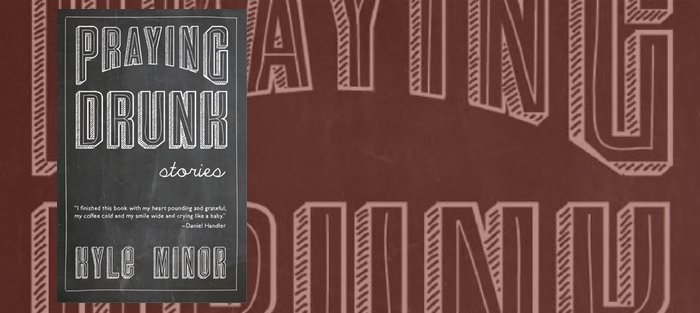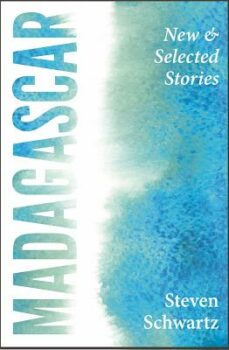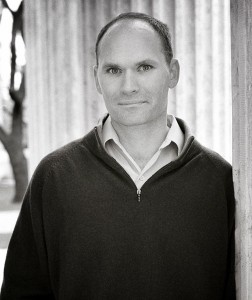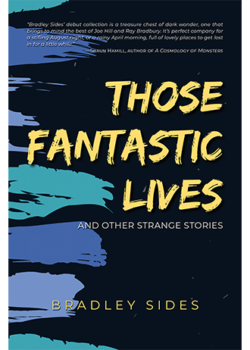Kyle Minor’s second story collection is one of the most aptly titled books I’ve read. So much about Praying Drunk (Sarabande Books) feels like a tipsy, dizzy spiritual pleading.
The deity invoked in these stories is sometimes the biblical God (playfully called “Big G”), but more often the god of stories, the creator of characters on the page. “What does it say about me, the god of this telling, that I have to take it to these dark places?” the narrator of one of the stories titled “Q&A” asks. Later, the unnamed respondent in the other “Q&A” story says, “I am the fiery angel. I can run time backward. I can speed it up and dance babies back into the womb.” The altered consciousness in these stories is as likely to be from a line of coke in the hands of a missionary, a hit of snorted painkillers that a father passes on to his son, a young man’s turn-on from listening to a girl speak in tongues, or the rush of blood in the mouth from a twelve-year-old bully’s punch.
Even before the table of contents, we are aware of the presence of an author who will refuse to be invisible, a disembodied voice that will force our participation as readers and engage in meta questions about the writing in the writing. The “Note to the Reader” warns us that “this is a book, not just a collection. DON’T SKIP AROUND.”
This directive immediately inserts us into the book as readers, but pushing this even further is Minor’s decision to open the first line of the first story, “The Question of Where We Begin,” with the first-person plural point of view. As such, we become co-narrators. We ask of the reader, of ourselves, “We begin with the trouble, but where does the trouble begin?” Yet this is not just any “we” at work here. It feels like the kind of dramatic device a performer would use with a live audience, perhaps a preacher booming rhetorical questions out into the pews. Just as an audience at church is self-selected, so are we, as reader-participants.
Yet even the beginnings aren’t beginnings. The narrative voice that begins this first story soon decides that “this beginning is not satisfactory.” He takes us further back, “parsing family-of-origin stuff.” Then further still, to grandparents and ancestors. Finally, the proper place to begin the story moves “from the historical to the cosmological.” While debating what a story is and how it works, Minor parcels out the actual story, about an uncle’s suicide, a story he will tell with varying points of view and frames several times in the book. The uncle’s death is gripping and devastating, but what is most impressive is how Minor riffs and thinks on the page, the virtuoso way he simultaneously illuminates the almost physical process of storymaking, while fully developing the characters, setting, and action.
Even when a story doesn’t directly address the reader, the book has an immediacy that makes us feel as if the author were in the same room with us. Minor’s narrators may sometimes seem godlike or even call themselves God, but the point of view is more intimate than omniscient. Every story is either told in the first person, through letters, entirely in dialogue, or as Q&A. These techniques make the book difficult to put down. When it feels as if someone is speaking directly to you and only to you, closing the book, even for a moment, feels rude—like closing a door or walking out on a lover. So, even though Praying Drunk might be classified as experimental, it is also a page turner. I read it quickly, in an almost hallucinatory daze, which is also why the title seems so apt.
We are sucked up into heaven—or, more often, hell, the stories big enough to Saran Wrap our souls. Minor dips his toes into redneck, second amendment territory, and his fingers into lofty Platonic discourse. Minor’s former life as a preacher saturates this book—and we can hear the stirring cadences from the pulpit in these pages, as well as the intuited grief, or loss of faith, or both, that must have precipitated the falling away—a falling that feels, at times, as if it’s still happening. Like the preacher in “The Sweet Life,” who gives a funeral elegy by pouring flour into a bowl to make biscuits, Minor adds enough humor and surrealism to make us feel we’ve never heard anything like this before. These stories, as I imagine Minor’s sermons used to be, are spiky and spirally, without a moral at the end.
But it’s not just the emotional register that’s in fine form here. Minor also takes huge risks in form and structure—which pay off brilliantly. Because two of the pieces are memoir (“You Shall Go Out with Joy and Be Led Forth with Peace,” which was first published in Twentysomething Essays by Twentysomething Writers, and “Suspended,” which originally appeared in Brevity), and because these pieces are similar in tone and feel to those that are fiction, Minor challenges our ideas that the two genres need to be distinct. One of Minor’s unnamed godlike characters tells us that fiction is:
What people write when they want to get away with telling the truth. When they want to convince you of a lie, they dress up some facts and call it “nonfiction.” Either way, people from the past send angry e-mails.
Part of the book’s mastery comes from stripping away the facade of suspending our disbelief when we read fiction and, instead, leveraging form and genre to pry out more than what either memoir or story can give us alone.
Minor doesn’t just challenge our notions that fiction and nonfiction don’t belong in the same book. He questions the idea that “literary” books can’t have elements of genre writing, such as science fiction. “The Truth and All Its Ugly” riffs a near-future dystopian comic sci-fi, in homage to George Saunders.
Praying Drunk has a wide range of characters and situations, which take place in far-flung locations and eras. We travel to Florida, Ohio, Kentucky, Haiti, and heaven, in the present, near future, and the near and prehistorically past. A dentist uses a file to make vampire teeth, one missionary snorts coke and another marries a high school girl half his age, a translator lies and swindles, a couple plays God by scanning in the DNA of their progeny, a preacher bakes biscuits as part of a funeral elegy, Haitian locals mount an insurrection against American missionaries, and a dying old man flirts with the nurse who inserts his false teeth and wants to believe that his grandson is writing a book about him. It is a testament to the author’s skill that, even with such diversity, the book feels like a single narrative, not a collection of unrelated stories.
Heed the book’s warning, and read the stories in order. The sometimes surreal, sometimes painfully real universe Minor creates grows exponentially in power as each story builds on the one that came before. We wouldn’t enter a play in the middle or leave before the end. The truest analogy I can come up with for this tour de force of a book is performance. Minor juxtaposes structure, theme, and genre, exposing his process to make the book a kind of performance, as preaching is. Whether it is a simultaneously spiritual and anti-spiritual sermon, a tender and macabre drama, or an eerie and empathic book-long prayer, Praying Drunk is an experience that will change us and stay with us long after its last word. Amen.






